Starting a business is exciting, but most entrepreneurs are immediately overwhelmed by the strict regulations and complex licensing processes involved in building a financial institution. But what if there was a simpler, community-driven model designed to encourage savings and provide easy credit within a trusted group of people?
That’s exactly what a Nidhi Company offers. Popular in India’s smaller towns and communities, Nidhi Companies allow individuals to pool money, support each other financially, and grow together without the burden of full-scale NBFC regulations.
This guide covers everything you need to know about Nidhi Company registration, process, requirements, compliances, and restrictions.
Table of Contents
What is Nidhi Company?
A Nidhi Company is a type of Non-Banking Financial Company (NBFC) that operates exclusively for its members. It is registered under Section 406 of the Companies Act, 2013 and regulated by the Ministry of Corporate Affairs (MCA), rather than directly by the Reserve Bank of India (RBI).
The primary function of a Nidhi Company is to accept deposits from members and lend money back to its members. This “for members only” model distinguishes it from other NBFCs and ensures that operations remain community-centric.
Since Nidhi Companies deal only with their members and do not interact with the general public, they enjoy exemptions from core RBI regulations that typically apply to other NBFCs. However, they must still adhere to rules laid down by MCA and maintain transparency in their financial dealings.
The Purpose and Nature of Nidhi Companies
The central purpose of Nidhi Companies is to promote savings and thrift among their members and to facilitate easy, low-interest loans for those same members. They act as mutual benefit societies, pooling deposits and using those funds to lend back within the group.
Key characteristics include:
- Community-Focused Model: Members both contribute and borrow, keeping financial circulation within the group.
- Limited RBI Oversight: While they fall under the broad category of NBFCs, Nidhi Companies are largely governed by MCA rules.
- Exemption from Core NBFC Rules: They are not required to obtain RBI approval for incorporation or daily operations.
This makes them a niche but highly effective option for people looking to run community-driven financial institutions.
Benefits of Nidhi Company
- Encourages Savings: Members are motivated to build disciplined saving habits.
- Access to Affordable Credit: Members can borrow at lower interest rates compared to market lenders.
- Limited Regulatory Burden: Exemptions from most RBI regulations make operations simpler.
- Low Risk of Default: Since lending and borrowing are limited to members, risks are lower.
- Simple Incorporation: Registration under MCA is more straightforward than NBFC licensing.
- Legal Status: Recognised as a public company, lending credibility and trust.
Nidhi Company Registration Process
Registering a Nidhi Company in India involves several steps:
- Obtain DSC & DIN – Digital Signature Certificate for proposed directors.
- Name Approval – File an application with MCA to get the company name approved (must include “Nidhi Limited”).
- Draft MOA & AOA – Prepare Memorandum of Association and Articles of Association with clear objectives.
- Filing for Incorporation – Submit the incorporation application along with required documents through MCA’s SPICe+ form.
- ROC Scrutiny – Registrar of Companies reviews and verifies the application.
- Certificate of Incorporation – Once approved, the company is legally formed.
- GSTIN & Bank Account – Apply for GST (if applicable), and open a current account for operations.
Related Read: How to apply for a Digital Signature Certificate in India
Compliances of the Nidhi Companies
After incorporation, a Nidhi Company must comply with specific filings and statutory requirements:
- NDH-1: Filing of return of statutory compliances within 90 days of the first financial year.
- NDH-2: Application to extend time for compliance (if required).
- NDH-3: Half-yearly return to ROC.
- MGT-7: Annual return filing with MCA.
- AOC-4: Filing of financial statements with MCA.
- Income Tax Compliances: Annual income tax return filing, tax audit (if applicable), TDS deductions, and advance tax payments.
Related Read: ROC Compliance Calendar 2025–2026: Important Filing Due Dates
Nidhi Company Incorporation Requirements
To incorporate a Nidhi Company, certain prerequisites must be met:
Before Registration:
- Minimum 7 members required.
- Minimum 3 directors.
- Minimum ₹5 lakh paid-up equity capital.
- The name must end with “Nidhi Limited”.
Post Registration (within 1 year):
- Minimum 200 members.
- Net Owned Funds (NOF) of at least ₹10 lakh.
- Deposits not to exceed 20 times NOF.
- Maintain at least 10% of deposits as unencumbered deposits (liquid assets).
Documents Required for Nidhi Company Registration
To register a Nidhi Company, you need the following documents:
- Identity Proof: PAN card of directors and members.
- Address Proof: Aadhaar card, passport, voter ID, or driving license.
- Photographs: Passport-sized photos of all directors and members.
- Office Proof: Rent agreement/ownership papers and utility bill of the registered office.
- Digital Signature Certificate (DSC) of directors.
- Charters: Draft MOA and AOA.
- Foreign Directors: Passport and notarised documents if applicable.
The entire process can be completed online via the MCA portal.
Restrictions on Nidhi Companies
To ensure that Nidhi Companies remain true to their purpose, certain restrictions apply:
- Cannot accept deposits from or lend to non-members.
- Cannot carry out chit funds, hire purchase, leasing finance, or insurance businesses.
- Cannot issue debentures, preference shares, or other securities.
- Cannot advertise for deposits to the general public.
- Cannot open current accounts in the name of members.
- Cannot conduct corporate transactions such as partnerships with other financial institutions.
- Must operate strictly within the framework of member-only deposit and lending.
Frequently Asked Questions (FAQs)
Private Limited Company
(Pvt. Ltd.)
- Service-based businesses
- Businesses looking to issue shares
- Businesses seeking investment through equity-based funding
Limited Liability Partnership
(LLP)
- Professional services
- Firms seeking any capital contribution from Partners
- Firms sharing resources with limited liability
One Person Company
(OPC)
- Freelancers, Small-scale businesses
- Businesses looking for minimal compliance
- Businesses looking for single-ownership
Private Limited Company
(Pvt. Ltd.)
- Service-based businesses
- Businesses looking to issue shares
- Businesses seeking investment through equity-based funding
One Person Company
(OPC)
- Freelancers, Small-scale businesses
- Businesses looking for minimal compliance
- Businesses looking for single-ownership
Private Limited Company
(Pvt. Ltd.)
- Service-based businesses
- Businesses looking to issue shares
- Businesses seeking investment through equity-based funding
Limited Liability Partnership
(LLP)
- Professional services
- Firms seeking any capital contribution from Partners
- Firms sharing resources with limited liability
Frequently Asked Questions
Can a Nidhi Company establish branch offices?
Yes, a Nidhi Company can open branch offices, but with conditions:
- It can open up to 3 branches within the same district after fulfilling compliance requirements.
- Prior approval from the Regional Director (MCA) is required to open branches outside the district.
- A Nidhi Company must have a profit after tax for 3 consecutive years before opening a branch.
Can a salaried individual serve as a Nidhi Company director?
Yes, a salaried individual can be appointed as a director in a Nidhi Company, provided:
- Their employment contract does not prohibit directorships.
- They comply with all MCA eligibility criteria (such as being a resident of India, holding a valid DIN, etc.).
What types of financial transactions are not permitted for Nidhi Companies?
Nidhi Companies are restricted from engaging in the following activities:
- Accepting deposits or lending to non-members.
- Running chit funds, hire purchase finance, leasing, or insurance businesses.
- Issuing preference shares, debentures, or other debt instruments.
- Opening current accounts in the name of members.
- Advertising for deposits from the general public.
Entering into partnerships in lending or borrowing.
Can a Nidhi Company do business in microfinance?
No, Nidhi Companies cannot operate as microfinance institutions (MFIs). Microfinance involves lending small amounts to non-members, often at higher interest rates, which violates Nidhi Company rules.
Is a Nidhi Company required to obtain an NBFC license from RBI?
No, a Nidhi Company does not need an NBFC license from RBI. They are exempt because their operations are limited to members and do not affect the wider public.
















